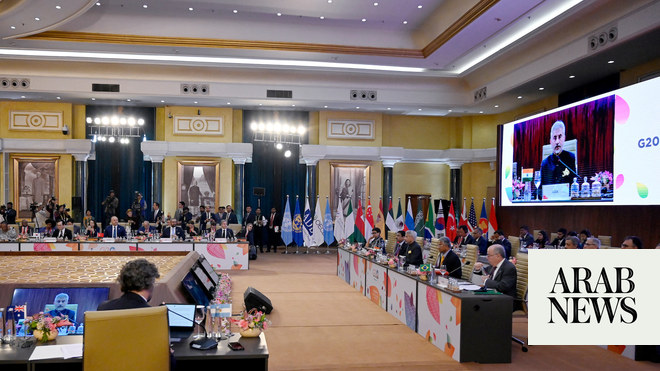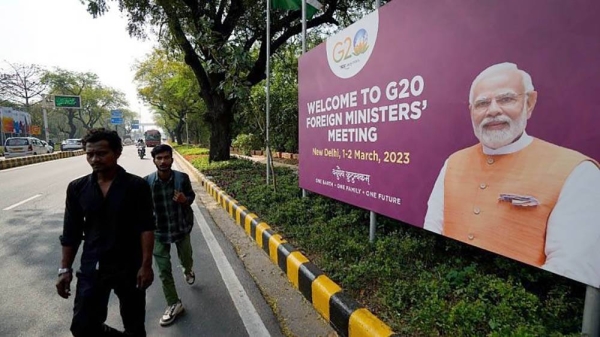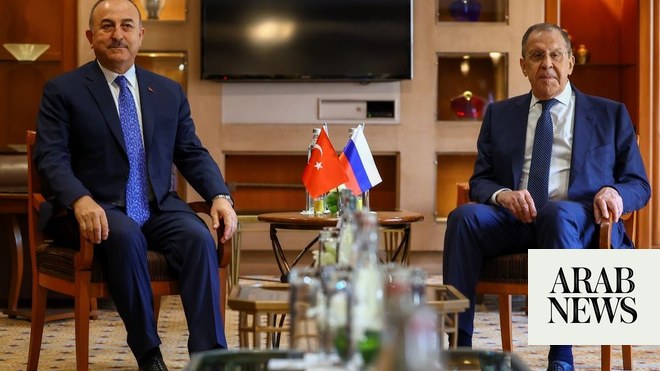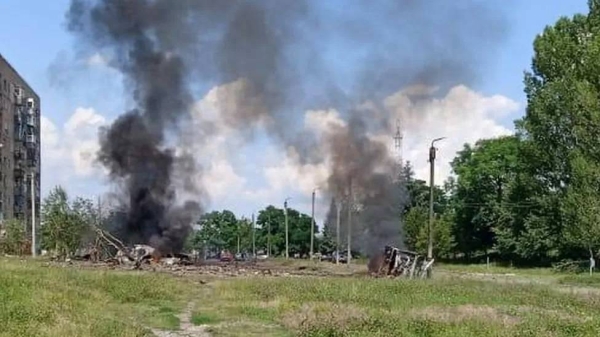
Meeting did not produce a joint communique as members could not “reconcile positions”
Presence of Oman, UAE, Egypt as G20 guests shows India’s increasing engagement with the Middle East
NEW DELHI: Most members of the Group of 20 condemned the war in Ukraine during a meeting in New Delhi on Thursday, with only Russia and China disagreeing.
As foreign ministers from the world’s largest economies, which include the US, Saudi Arabia, Indonesia, Russia, China, Japan and the EU, arrived in India, which this year holds the G20 presidency, Prime Minister Narendra Modi called on them to find “common ground” on divisive issues.
But tensions over Russia’s ongoing invasion of Ukraine, which started in February last year, dominated Thursday’s talks.
The meeting did not produce a joint communique, as Indian Foreign Minister Subrahmanyam Jaishankar said G20 members could not “reconcile positions” on Ukraine and “there were divergences” on issues related to the conflict.
The conference, however, produced an outcome document that reflected agreement on the bulk of issues related to the global south or developing countries.
“Despite differences on Ukraine, we all were able to reach consensus on other issues,” Jaishankar told reporters.
“There was a large number of issues where there was agreement: multilateralism, food and energy security, climate change, gender issues, global health, terrorism. There was a considerable meeting of minds. If we had a perfect meeting of minds, we could have had a collective statement, but divergences on Ukraine did come in the way of that.”
He added that all G20 members condemned terrorism in all its forms and for the first time also discussed counternarcotics efforts.
The outcome of the meeting came as no surprise, with experts saying that the same differences marred last year’s G20 meetings when the bloc’s presidency was held by Indonesia.
“There was no joint statement after the foreign ministers’ meeting in Bali. This trend is not at all surprising given the way the G20 is strongly divided between G7 and other countries,” Rezaul H. Laskar, foreign affairs expert and editor of Hindustan Times, told Arab News.
“One important consequence of this lack of consensus is going to be that it puts pressure on India to build bridges between G7 on the one side and China and Russia on the other side…India already has its own challenges dealing with Western pressure because of the Ukrainian crisis. It has its own challenges at the border with China. So, there would be the need for more nimble and assured diplomacy from the Indian side.”
What has been already visible in Indian efforts as it leads the G20 bloc is New Delhi’s increasing engagement with the Middle East.
As the G20 president, India could invite special non-G20 guests to participate in the group’s meetings. Among them are the UAE, Oman and Egypt.
Anil Wadhwa, former Indian ambassador to Oman, told Arab News that the invitations signify growth in bilateral ties with these countries, especially Oman and Egypt.
“Trust has grown with both countries, which are now active defense partners of India…The potential of economic ties and investments both ways is an added incentive. The burgeoning ties with these countries will allow India to reach out as a friend and confidante to Arabic-speaking countries in the Gulf Cooperation Council as well as North Africa,” Wadhwa said.
The foreign ministers’ gathering was the second ministerial-level talk since India assumed the G20 presidency in December. Last week, the group’s finance ministers met in Bangalore, where the invasion of Ukraine was also a major theme. The meeting resulted in no communique being issued at the end of the session after Russia and China sought to water down language on the war.
“The conference is taking place at a time when the US-led West and Russia-China on the other side have hardened their positions. We saw it last week in the finance ministers’ meeting. The same arguments are being played out in the G20 foreign ministers’ meeting,” said Shubhajit Roy, foreign affairs correspondent of Indian Express.
“We just saw US Secretary of State Antony Blinken saying that Russia has been marred by its positions. Russian Foreign Minister Sergey Lavrov has spoken on a similar line. It is a deadlock. There is no consensus.”












